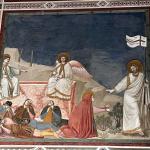Understanding Islam Part 2: View of Jesus
Mark Driscoll
In this blog series I am posting work done by researchers for another project I was working on a few years ago. My hope is to help provide some understanding of Islam for Christians that leads to further study and also a desire to lovingly befriend Muslims in their own community to enable further mutual understanding.
The Quran on Jesus
All Muslims believe Jesus was a great prophet–yet he was only a man. They believe he was sent by God to help people obey God. Islam claims Jesus spoke as a baby, healed the sick, and raised the dead. The Quran refers to Jesus as the breath of God, the spirit of God, the life of God and the word of God. Muslims do not think Jesus died on the cross. They believe that right before he was to be killed, God took him up to heaven and someone else (probably Judas) replaced him on the cross. They trust that Jesus will return to the earth again to usher in the final judgment from God and confirm that Islam is the true and final religion for all humankind.
Many Muslims think Christians believe in three gods: God the Father, God the Son, and God the Mother (Mary). They believe that Christians and Jews have changed the Bible; therefore, although the Quran acknowledges the Gospel of Christ, the Torah of Moses and the Psalms of David, the existing copies can’t be trusted. In any case, they are all superseded by the Quran.
While Muslims think Jesus was only a man — a prophet superseded by Muhammad — at the same time the Qur’an teaches that Jesus Christ was the Messiah, the Word of God, a speaker of truth, and a sign unto men of mercy from God. The crucial thing Muslims don’t believe is that Jesus died on the cross for our sins and rose from the dead. However, the Jesus of the New Testament claimed to be God, not just a prophet. Jesus said, “I and the Father are one” (John 10:30). In John 8:58 Jesus said to some Jews, “Before Abraham was, I am,” thereby claiming to be God (cf. Exod. 3:14). He received worship on many different occasions. One of His disciples bowed before Him and said, “My Lord and my God” (John 20:28), acknowledging His full deity. Jesus forgave sins, which only God can do (Mark 2:5-7). Jesus resurrected people from the dead, which only God has the power to do (John 11:38-44). So Jesus in many different ways is shown to be God, not just a prophet. The Bible and the Qur’an are irreconcilable on these ideas as well as Jesus being the Son of God as stated in the Bible (Matt. 1:20, 21; Luke 1:32).
The Quran bears surprising witness to Jesus. It affirms His virgin birth, His ability to heal and raise the dead, that He is both a word from God and a spirit from God, that He is the Messiah, an all-righteous one (sinless), among those nearest to God, that He is alive in heaven now and will return to judge the earth (Quran 3:45, 49; 4:158; 82:22).
In a careful reading of Quranic references (3:84; 5:51, 71; 6:34; 10:37, 64, 94; 46:12), we find that Muhammad affirmed his belief in what was revealed to Moses and Jesus. He taught that God confirms and guards all previous scripture, that Christians are to stand fast on their own books of the Law and the Gospel, and that none could change the Word of God. Finally, the Muslim is told that if he has doubts he should ask the Jews and Christians, who were reading the Holy Books before he was.
In the Quran (2:253; 3:45-49; 4:158, 171; 5:49; 19:33; 89:22) it is noted that Jesus was called the Messiah; He was born of a virgin; He was among the righteous ones — those nearest to God; He received strength from the Holy Spirit; He could give sight to the blind, cure lepers, and raise the dead; He prophesied His own death and resurrection; He was called a Word from God and a Spirit from God; and finally, He is coming back with thousands of angels to judge the world.
The Quran exhorts Muhammad (and others, too) to seek forgiveness of his sins (Q. 40:55; 42:5; 47:19). The universality of sin is mentioned in Quran 16:61. The Quran also says that whatever misfortune happens to a Muslim happens because of his sin (Q. 42:30). It further says that even when victory comes it occurs so that God may forgive one’s sins (Q. 48:1, 2). From these verses, one can demonstrate that no one is sinless or capable of being the “Light of the World.” The big exception, of course for Christians, is Jesus. Even in the Quran, we read that he is “among the righteous ones,” that is, sinless (Q. 3:46).















